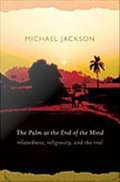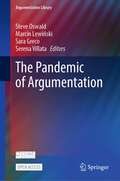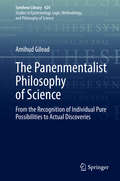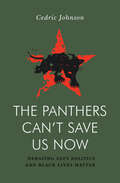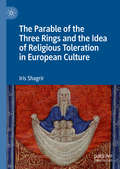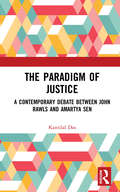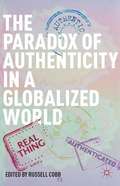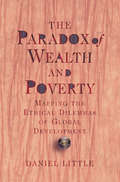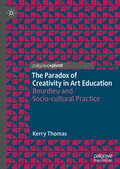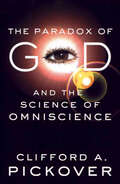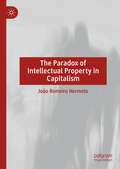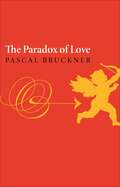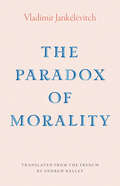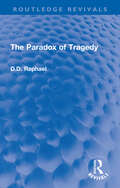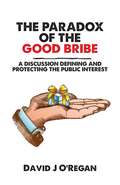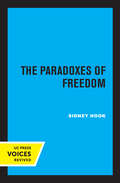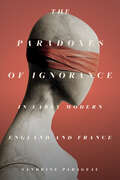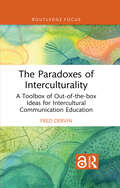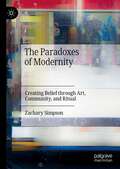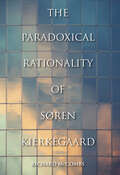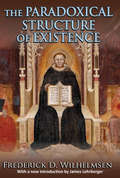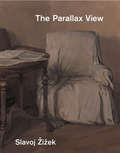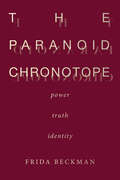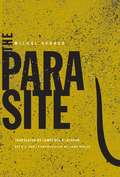- Table View
- List View
The Palm at the End of the Mind: Relatedness, Religiosity, and the Real
by Michael JacksonIn many societies and for many people, religiosity is only incidentally connected with texts or theologies, church or mosque, temple or monastery. Drawing on a lifetime of ethnographic work among people for whom religion is not principally a matter of faith, doctrine, or definition, Michael Jackson turns his attention to those situations in life where we come up against the limits of language, our strength, and our knowledge, yet are sometimes thrown open to new ways of understanding our being-in-the-world, to new ways of connecting with others. Through sixty-one beautifully crafted essays based on sojourns in Europe, West Africa, the United States, Australia, and New Zealand, and taking his cue from Wallace Stevens's late poem, "Of Mere Being," Jackson explores a range of experiences where "the palm at the end of the mind" stands "beyond thought," on "the edge of space," "a foreign song. " Moments of crisis as well as everyday experiences in cafs, airports, and offices disclose the subtle ways in which a single life shades into others, the boundaries between cultures become blurred, fate unfolds through genealogical time, elective affinities make their appearance, and different values contend.
The Pandemic of Argumentation (Argumentation Library #43)
by Serena Villata Steve Oswald Sara Greco Marcin LewińskiThis open access book addresses communicative aspects of the current COVID-19 pandemic as well as the epidemic of misinformation from the perspective of argumentation theory. Argumentation theory is uniquely placed to understand and account for the challenges of public reason as expressed through argumentative discourse. The book thus focuses on the extent to which the forms, norms and functions of public argumentation have changed in the face of the COVID-19 pandemic. This question is investigated along the three main research lines of the COST Action project CA 17132: European network for Argumentation and Public PoLicY analysis (APPLY): descriptive, normative, and prescriptive. The volume offers a broad range of contributions which treat argumentative phenomena that are directly related to the changes in public discourse in the wake of the outburst of COVID-19. The volume additionally places particular emphasis on expert argumentation, given (i) the importance expert discourse has had over the last two years, and (ii) the challenges that expert argumentation has faced in the public sphere as a result of scientific uncertainty and widespread misinformation. Contributions are divided into three groups, which (i) examine various features and aspects of public and institutional discourse about the COVID-19 pandemic, (ii) scrutinize the way health policies have been discussed, debated, attacked and defended in the public sphere, and (iii) consider a range of proposals meant to improve the quality of public discourse, and public deliberation in particular, in such a way that concrete proposals for argumentative literacy will be brought to light. Overall, this volume constitutes a timely inquiry into all things argumentative in pandemic discourse. This volume is of interest to a broad readership including philosophers, linguists, communication and legal scholars, and members of the wider public who seek to better understand the discourse surrounding communicative phenomena in times of crisis.COST (European Cooperation in Science and Technology) is a funding organisation for research and innovation networks. For more information: www.cost.eu
The Panenmentalist Philosophy of Science: From the Recognition of Individual Pure Possibilities to Actual Discoveries (Synthese Library #424)
by Amihud GileadThis book presents a philosophy of science, based on panenmentalism: an original modal metaphysics, which is realist about individual pure (non-actual) possibilities and rejects the notion of possible worlds. The book systematically constructs a new and novel way of understanding and explaining scientific progress, discoveries, and creativity. It demonstrates that a metaphysics of individual pure possibilities is indispensable for explaining and understanding mathematics and natural sciences. It examines the nature of individual pure possibilities, actualities, mind-dependent and mind-independent possibilities, as well as mathematical entities. It discusses in detail the singularity of each human being as a psychical possibility. It analyses striking scientific discoveries, and illustrates by means of examples of the usefulness and vitality of individual pure possibilities in the sciences.
The Panthers Can't Save Us Now: Debating Left Politics and Black Lives Matter
by Cedric JohnsonEnding the horrors of police violence requires addressing economic inequalityIn the wake of the mass protests following the police murder of George Floyd nearly every major consumer brand had proclaimed their commitments to antiracism, often with new ad campaigns to match their tweets. Very little in the way of police reform has been achieved. Still less was achieved around policies that might help the millions of black Americans living at or below the poverty line. Why has anti-racism been such a powerful source of mobilization but such a poor means of building political opposition capable of winning big reforms? This volume revisits a debate that transpired during Black Live Matter&’s first wave. Writing against the grain of popular left sentiments, Johnson cautions against a new ethnic politics. Instead, he calls for broad-based left politics as the only viable means for ending the twin crises of racial inequality and police violence. Redistribution, public goods, and multi-ethnic working-class solidarity are the only viable response to the horrors of police violence and mass incarceration. It just so happens that fighting the conditions that make crime and violence inevitable is also the means by which we can build a working-class majority and a more equal and peaceful nation.
The Parable of the Three Rings and the Idea of Religious Toleration in European Culture
by Iris ShagrirThis book examines the premodern encounter between the three monotheistic religions through the unique prism of a premodern literary work—The Parable of the Three Rings—a poignant and charming tale of a father who had three sons and one precious ring. By tradition he was to bequeath the ring to his heir, but he loved his three sons equally — so he had two new rings made, crafted to be indistinguishable from the original, and on his deathbed gave a ring to each son. The narrator explains that the father is God, and his sons are the Jews, the Christians, and the Muslims, each believing themselves to be the sole upholders of the true religion. A historical and literary study, the book offers a comprehensive discussion of the various guises of the Parable, from the early Middle Ages onwards, and highlights its capacity to reflect openness and pluralism in the interfaith encounter.
The Paradigm of Justice: A Contemporary Debate between John Rawls and Amartya Sen
by Kantilal DasThis book deals with the fascinating debate over the concept of justice proposed by two contemporary thinkers, namely, John Rawls and Amartya Sen. Justice means what is just, but how do we know what is just? What would be the viable criterion to legitimize justice? Is justice objective or subjective? Is justice a matter of ontological issue or an issue of realization? What would be the paradigm of justice? These are some important issues discussed in the book. Please note: Taylor & Francis does not sell or distribute the Hardback in India, Pakistan, Nepal, Bhutan, Bangladesh and Sri Lanka.
The Paradox Of Authenticity In A Globalized World
by Russell CobbAuthenticity in our globalized world is a paradox. This collection examines how authenticity relates to cultural products, looking closely at how a particular "ethnic" food, or genre of popular music, or indigenous religious belief attains its aura of originality, when all traditional cultural products are invented in a certain time and place.
The Paradox Of Wealth And Poverty: Mapping The Ethical Dilemmas Of Global Development
by Daniel LittleWe live in a time of human paradoxes. Scientific knowledge has reached a level of sophistication that permits understanding of the most arcane phenomena and yet religious fundamentalism dominates in many parts of the world. We witness the emergence of a civil, liberal constitutionalism in many regions of the world and yet ethnic violence threatens the lives and dignity of millions. And we live in a time of rapid economic and technological advance and yet several billions of people live in persistent debilitating poverty. In this book, Daniel Little dissects these paradoxes offering the clearest perspective on how best to approach international development.Using both empirical and philosophical approaches, Little provides a schematic acquaintance with the most important facts about global development at the turn of the twentieth century. In doing so, he explores what appear to be the most relevant moral principles and insights that ought to be invoked as we consider these facts and then draws conclusions about what sorts of values and goals ought to guide economic development in the twenty-first century.
The Paradox of Creativity in Art Education: Bourdieu and Socio-cultural Practice
by Kerry ThomasThis book examines the paradox of creativity in art education and proposes a possible resolution. Based on the findings of a longitudinal ethnographic study as a particular case of creative practice in art education, this book is underpinned by Bourdieu’s concepts of the habitus, symbolic capital and misrecognition. The author offers an insightful account of social reasoning within creative practice in the senior school art classroom, examining ongoing exchanges between students and their teacher. Ultimately, these exchanges culminate in actions, beliefs and desires about what is creatively conceivable in the making of art, while providing confirmation without corruption of the pedagogical role of the art teacher. Allowing the context of creative agency to emerge afresh, this book will be of interest and value to art educators and teachers committed to fostering the creative performances of students in any field.
The Paradox of God and the Science of Omniscience
by Clifford A. PickoverIn his most ambitious book yet, Clifford Pickover bridges the gulf between logic, spirit, science, and religion. While exploring the concept of omniscience, Pickover explains the kinds of relationships limited beings can have with an all-knowing God. Pickover's thought exercises, controversial experiments, and practical analogies help us transcend our ordinary lives while challenging us to better understand our place in the cosmos and our dreams of a supernatural God. Through an inventive blend of science, history, philosophy, science fiction, and mind-stretching brainteasers, Pickover unfolds the paradoxes of God like no other writer. He provides glimpses into the infinite, allowing us to think big, and to have daring, limitless dreams.
The Paradox of Intellectual Property in Capitalism
by João Romeiro HermetoThe Paradox of Intellectual Property in Capitalism is an innovative book that comprehensively discusses and analyses intellectual property under capitalistic social conditions and relations. It not only addresses some historical developments of intellectual property but also brings to the fore the very notion of what knowledge is, knowledge creation, and knowledge production and appropriation within a Marxist framework. Nonetheless, the adopted approach pays heed to multiple fields of knowledge, providing rich discussions that facilitate the understanding of actual social totality in which capitalism, knowledge production and appropriation, and the struggles of appropriation mutually reinforce each other, although not devoid of antagonisms and contradictions. In light of contemporary capitalism, the transformations that social property relations are undergoing must be scrutinised – such as those brought about by the development of digitalisation and the convergence between big pharma and tech giants. What are the conditions of intellectual property creation today? What theoretical assumptions does it make? Under what social relations is intellectual property produced? Throughout, the emphasis is not on individual cases or symptoms but on the overarching logic: the logic of capitalism as revealed in intellectual property.
The Paradox of Love
by Pascal BrucknerA provocative reflection on the dilemmas of modern loveThe sexual revolution is justly celebrated for the freedoms it brought—birth control, the decriminalization of abortion, the liberalization of divorce, greater equality between the sexes, women's massive entry into the workforce, and more tolerance of homosexuality. But as Pascal Bruckner, one of France's leading writers, argues in this lively and provocative reflection on the contradictions of modern love, our new freedoms have also brought new burdens and rules—without, however, wiping out the old rules, emotions, desires, and arrangements: the couple, marriage, jealousy, the demand for fidelity, the war between constancy and inconstancy. It is no wonder that love, sex, and relationships today are so confusing, so difficult, and so paradoxical.Drawing on history, politics, psychology, literature, pop culture, and current events, this book—a best seller in France—exposes and dissects these paradoxes. With his customary brilliance and wit, Bruckner traces the roots of sexual liberation back to the Enlightenment in order to explain love's supreme paradox, epitomized by the 1960s oxymoron of "free love": the tension between freedom, which separates, and love, which attaches. Ashamed that our sex lives fail to live up to such liberated ideals, we have traded neuroses of repression for neuroses of inadequacy, and we overcompensate: "Our parents lied about their morality," Bruckner writes, but "we lie about our immorality.?Mixing irony and optimism, Bruckner argues that, when it comes to love, we should side neither with the revolutionaries nor the reactionaries. Rather, taking love and ourselves as we are, we should realize that love makes no progress and that its messiness, surprises, and paradoxes are not merely the sources of its pain—but also of its pleasure and glory.
The Paradox of Morality (The Margellos World Republic of Letters)
by Vladimir JankelevitchThe last work by &“one of the most singular voices of twentieth-century French philosophy&” (Critical Inquiry) on the complexities of love in public and private life Vladimir Jankélévitch stands alongside Emmanuel Levinas as one of the most admired French ethicists of the twentieth century, known for his work on everything from the possibility of forgiveness after the Holocaust to the philosophy of music. In his final work, The Paradox of Morality (1981), Jankélévitch turns his attention to the fundamental questions of the moral life: the struggle between egoism and self-sacrifice, the question of whether pure or infinite love exists, and moral agency in the pursuit of human rights. In dialogue with philosophers from Plato to Nietzsche, Jankélévitch proposes that the moral life comprises an acrobatic act in which we must balance the demands of love and our responsibility to the other against our natural attachment to the self. Morality is the activity of realizing and combining, in each individual action, the maximum amount of love possible with the minimum of being. This oscillation between self and other—and between being and love—is never fixed or stable. In the end, morality is not something that exists in the world of contemplation; instead, it is the substance of what must be done here and now: created anew in each new moment.
The Paradox of Tragedy: The Mahlon Powell Lectures, 1959 (classic Reprint) (Routledge Revivals)
by D.D. RaphaelFirst published in 1960, The Paradox of Tragedy raises the fundamental question, why do we enjoy tragic drama with its themes of death and disaster? Aristotle’s theory of catharsis is still widely accepted as a satisfactory explanation of this paradox. In the first of its two connected essays, D.D. Raphael argues that Aristotle’s account of tragic emotions is distorted by a faulty psychology and fails to solve the problem. Raphael offers instead a new theory of Tragedy, as a conflict between two forms of the sublime, in which the sublimity of human heroism is exalted above the sublimity of overwhelming power. The spirit of the Tragedy is liable to conflict with doctrines of Biblical theology, and the difficulties of fusing the two are explored with illustrations from Greek, Biblical, English, and French literature. The second essay discusses the wider topic of philosophical drama, considering in what sense tragic and other forms of serious drama may be called philosophical, and also pointing out the dramatic shape of much of Plato’s philosophy. In this discussion, the question of religious Tragedy reappears in a different perspective. This book will be an essential read for scholars and researchers of philosophy in general and political philosophy in particular.
The Paradox of the Good Bribe: A Discussion Defining and Protecting the Public Interest
by David J O'ReganWhat do Plato and the Bible tell us about bribery? Does it even matter? When it comes to ethical guidance on bribery should we look less to traditional wisdom and instead be seeking understanding and guidance primarily from modern sources? From economists
The Paradoxes of Art: A Phenomenological Investigation
by Alan PaskowAlan Paskow first asks why fictional characters, such as Hamlet and Anna Karenina, matter to us and how they are able to emotionally affect us. He then applies these questions to pictorial art, demonstrating that paintings beckon us to view their contents as real. Emblematic of the fundamental concerns of our lives, what we visualize in paintings, he argues, is not simply in our heads but in our world. Paskow also situates the phenomenological approach to the experience of painting in relation to methodological assumptions and claims in analytic aesthetics as well as in contemporary schools of thought, particularly Marxist, feminist, and deconstructionist.
The Paradoxes of Freedom
by Sidney HookThis title is part of UC Press's Voices Revived program, which commemorates University of California Press’s mission to seek out and cultivate the brightest minds and give them voice, reach, and impact. Drawing on a backlist dating to 1893, Voices Revived makes high-quality, peer-reviewed scholarship accessible once again using print-on-demand technology. This title was originally published in 1962.
The Paradoxes of Ignorance in Early Modern England and France
by Sandrine ParageauIn the early modern period, ignorance was commonly perceived as a sin, a flaw, a defect, and even a threat to religion and the social order. Yet praises of ignorance were also expressed in the same context. Reclaiming the long-lasting legacy of medieval doctrines of ignorance and taking a comparative perspective, Sandrine Parageau tells the history of the apparently counter-intuitive moral, cognitive and epistemological virtues attributed to ignorance in the long seventeenth century (1580s-1700) in England and in France. With close textual analysis of hitherto neglected sources and a reassessment of canonical philosophical works by Montaigne, Bacon, Descartes, Locke, and others, Parageau specifically examines the role of ignorance in the production of knowledge, identifying three common virtues of ignorance as a mode of wisdom, a principle of knowledge, and an epistemological instrument, in philosophical and theological works. How could an essentially negative notion be turned into something profitable and even desirable? Taken in the context of Renaissance humanism, the Reformation and the "Scientific Revolution"—which all called for a redefinition and reaffirmation of knowledge—ignorance, Parageau finds, was not dismissed in the early modern quest for renewed ways of thinking and knowing. On the contrary, it was assimilated into the philosophical and scientific discourses of the time. The rehabilitation of ignorance emerged as a paradoxical cornerstone of the nascent modern science.
The Paradoxes of Interculturality: A Toolbox of Out-of-the-box Ideas for Intercultural Communication Education (New Perspectives on Teaching Interculturality)
by Fred DervinOffering a unique reading experience, this book examines the epistemologies of interculturality and explores potential routes to review and revisit the notion anew.Grounded in different sociocultural, economic and political perspectives around the world, interculturality in education and research bears a paradoxical attribute of 'contradictions' and 'inconsistencies', making it a polysemous and flexible notion that has no definitive diagnosis and requires constant unthinking and rethinking. The author provides a toolbox of 'out-of-box ideas' in the form of fragmental yet standalone writings and follow-up questions concerning stereotypes about the very notion of interculturality and conceptual and methodological flaws in the way it is used. Readers are encouraged to critically reflect about interculturality as it stands today in global research and education. In identifying the paradoxes of interculturality and proposing alternative directions, the book stimulates a diversity of thoughts about the notion that goes beyond the 'West'. The book will be an essential reading for scholars, students and educators interested in education philosophy, applied linguistics and the broad field of intercultural communication education.
The Paradoxes of Modernity: Creating Belief through Art, Community, and Ritual
by Zachary SimpsonA paradox lies at the heart of modernity: the simultaneous demand to create ideas to make us better humans and communities, along with the contrary imperative that we criticize all ideals, especially the ones we have created. In philosophy we see this paradox most acutely in figures like Immanuel Kant, who states that we cannot know the essence of things and yet we must retain old ideas – God, freedom, and the soul – in order to become better and more ethical humans. Or in Friedrich Nietzsche, whose eternal recurrence, a self-created myth whose sole purpose is to get us to see the value in the everyday. This basic scheme – belief and un-belief – is one of the fundamental elements of modernity, manifesting itself in the philosophies of Herbert Marcuse and Michel Foucault, along with the theologies of Blaise Pascal, C.S. Lewis, William James, Sallie McFague, and Philip Clayton.How do we live out the values we know to be constructions? This question holds captive our ability to solve public goods problems and make our lives more meaningful. Instead of seeing this paradox of modernity as self-deception or bad faith, Zachary Simpson employs cognitive and social scientific research to explain how best to realize values that we know to be false: through art, community, and ritual. In Simpson's account, the values we construct must conform to narrative, be reinforced through community, and habituated through ritual. And yet modernity has also undermined collectivity and ritual. Thus arises the second paradox of modernity: the best tools we have for realizing values are those which devalue the individual modern subject.The last part of the book attempts to make three normative points regarding modernity. First, the modern, individualist subject is insufficient to realize the very values and aspirations of modernity. We must recognize that humans are collective and communal. Second, we cannot simply create values – they must arise in communities and be realized through narrative and ritual. And, third, if we are to live meaningful lives as contemporary meta-ethicists and positive psychologists argue, then such lives must include art, community, and ritual as a way to affirm and reinforce one’s values.Let’s Pretend is a statement about one of the dilemmas of the contemporary western world and how that dilemma is, and might be, resolved. How do we believe in the values that we know will make a better world, even if they are of our own making? We must do so, in part, by becoming less modern, by engaging with one another and imagining more.The book should serve as both an essay in the history of Western thought as well as a constructive argument about the nature of the modern epoch and what resources we have to realize the central aspirations of modernity. It aims to fill a critical lacuna in theoretical and philosophical approaches to modernity. While most texts focus on either the need for created values or the need to remedy modern subjectivity, few, if any, link the two problems together. Moreover, they do not ground their analyses in the social sciences and contemporary findings regarding the efficacy of narrative, communal action, and rituals.The book is unique, then, because it asks a central question – how do we believe in what we know to be false? – and because it answers this question using interdisciplinary methods that allow us to see the faultlines and paradoxes of our age.
The Paradoxical Rationality of Søren Kierkegaard
by Richard MccombsSøren Kierkegaard deliberately feigned irrationality in many of his pseudonymous writings in order to present a rational argument about reason and faith. Richard McCombs posits that Kierkegaard's strategy of revealing the philosophical and religious underpinnings of his thought was both instructive and misguided. Focusing on pseudonymous works by Johannes Climacus and Anti-Climacus, McCombs discusses Kierkegaard's irrationality and the manner in which it bolsters important truths about rationality. He reveals Kierkegaard striving for a single, integrated self that thinks, feels, wills, acts, and communicates with purpose. This fresh reading of Kierkegaard engages an essential problem in the philosophy of religion--the difference between what is understood by reason and what must be taken on faith.
The Paradoxical Structure of Existence
by Frederick D. WilhelmsenFor metaphysicians who have imbibed the sober and inebriating teachings of Thomas Aquinas, existence is an act, the act which makes all things actually to be. As the act of existence makes things to be, essence makes them to be what they are. Essence and the act of existence, in other words, are really distinct yet together they compose each of the things that are.Such an understanding involves a number of paradoxes, and Frederick D. Wilhelmsen's articulation of them reveals his philosophical genius. These paradoxes include the fact that the act of existence does not exist, that it can be thought but not conceived by the mind, and that truths about God can be known while He himself remains absolutely unknown. Wilhelmsen argues the notion that the Christian faith and philosophical reason harmonize while remaining completely distinct from each other.Writing in a captivating style, Wilhelmsen begins with a discussion of the development, strengths, and limitations of the ancient Greek philosophical accounts of being. Following that, he develops such key topics as the problem of existence, St. Thomas Aquinas' understanding of being, critical analyses of Hegel's and Heidegger's doctrines of being, existence as "towards God," and a metaphysical approach to the human person. The final two chapters develop the sense in which metaphysical thinking is and is not shaped by historical and social factors.
The Parallax View (Short Circuits)
by Slavoj ZizekIn Žižek's long-awaited magnum opus, he theorizes the "parallax gap" in the ontological, the scientific, and the political—and rehabilitates dialectical materialism. The Parallax View is Slavoj Žižek's most substantial theoretical work to appear in many years; Žižek himself describes it as his magnum opus. Parallax can be defined as the apparent displacement of an object, caused by a change in observational position. Žižek is interested in the "parallax gap" separating two points between which no synthesis or mediation is possible, linked by an "impossible short circuit" of levels that can never meet. From this consideration of parallax, Žižek begins a rehabilitation of dialectical materialism. Modes of parallax can be seen in different domains of today's theory, from the wave-particle duality in quantum physics to the parallax of the unconscious in Freudian psychoanalysis between interpretations of the formation of the unconscious and theories of drives. In The Parallax View, Žižek, with his usual astonishing erudition, focuses on three main modes of parallax: the ontological difference, the ultimate parallax that conditions our very access to reality; the scientific parallax, the irreducible gap between the phenomenal experience of reality and its scientific explanation, which reaches its apogee in today's brain sciences (according to which "nobody is home" in the skull, just stacks of brain meat—a condition Žižek calls "the unbearable lightness of being no one"); and the political parallax, the social antagonism that allows for no common ground. Between his discussions of these three modes, Žižek offers interludes that deal with more specific topics—including an ethical act in a novel by Henry James and anti-anti-Semitism. The Parallax View not only expands Žižek's Lacanian-Hegelian approach to new domains (notably cognitive brain sciences) but also provides the systematic exposition of the conceptual framework that underlies his entire work. Philosophical and theological analysis, detailed readings of literature, cinema, and music coexist with lively anecdotes and obscene jokes.
The Paranoid Chronotope: Power, Truth, Identity
by Frida BeckmanWhy does it seem like our everyday life is shadowed by something menacing? This book identifies and illuminates paranoia as a significant feature of contemporary American society and culture. Centering on what it identifies as three key dimensions – power, truth, and identity – in three different contexts – society, literature, and critique – the book explores and explains the increasing influence of paranoid thinking in American society during the second half of the twentieth century and first decades of the twenty-first, a period that has seen the rise of control systems and neoliberal ascendency. Inquiring about the predominance of white, male, American subjects in paranoid culture, Frida Beckman recognizes the antagonistic maintenance and fortification of a conception of the autonomous individual that perceives itself to be under threat. Identifying such paranoia as emerging from an increasingly disjunctive relation between this conception of the subject and the changing nature of the public sphere, she develops the concept of the paranoid chronotope as a tool for the theoretical analysis of social, literary, and critical practices today. Investigating twenty-first century paranoid fictions, New Sincerity novels, conspiracist online culture, and postcritique, Beckman shows how the paranoid chronotope constitutes a recurring feature of modern consciousness.
The Parasite (Posthumanities #1)
by Michel SerresInfluential philosopher Michel Serres&’s foundational work uses fable to explore how human relations are identical to that of the parasite to the host body. Among Serres&’s arguments is that by being pests, minor groups can become major players in public dialogue—creating diversity and complexity vital to human life and thought.
